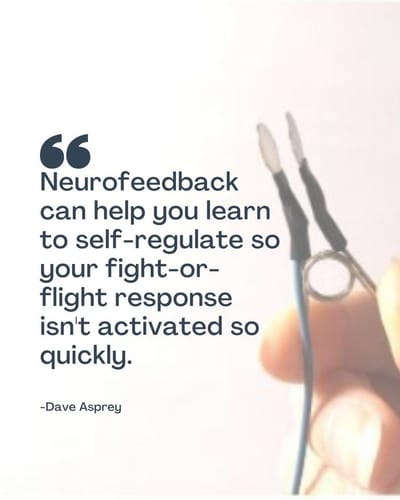neurofeedback for anxiety


 Anxiety is one of those things that slowly took over our lives. It’s everywhere and everyone is experiencing it. Including children, unfortunately. And even studies can prove this: only in the United States anxiety disorders affect over 40 million people. And we have to consider that a lot of cases go undiagnosed.
Anxiety is one of those things that slowly took over our lives. It’s everywhere and everyone is experiencing it. Including children, unfortunately. And even studies can prove this: only in the United States anxiety disorders affect over 40 million people. And we have to consider that a lot of cases go undiagnosed.So what exactly is anxiety? It’s an emotion that leads to worry, apprehension, excessive nervousness, and fear. Most of the time, it’s a normal thing to have. After all, everybody feels anxious once in a while.
But it becomes a problem when anxiety starts being a constant in your life and you feel anxious most of the time. This is when it turns into a medical disorder.
And in today’s world, there are so many things that can trigger anxiety.
For example, you dislike your job, and just the thought of going to work gives you anxiety. But if you didn’t have a job, you couldn’t pay your rent, bills, and living expenses. So the idea of quitting or being laid off also causes you anxiety.
This can also happen to children. They can be anxious about scholastic performance, tests, or even social status. But, the thing is, you don’t need a big reason to be anxious. Small things can also cause anxiety, and it’s this combined anxiety that really leads to further health problems.
Now, there are a lot of things that you can do to treat or ease anxiety, and neurofeedback is one of them.
Why Is Anxiety Bad for You?
As we mentioned before, anxiety is a pretty healthy emotion that everybody is capable of feeling. We actually need anxiety because it was and still is a vital component to our survival. But it can become a problem when you’re feeling too much of it.
Generally, anxiety can cause several symptoms, such as:
- increased irritability
- concentration difficulties
- sleeping difficulties
- fatigue
- restlessness
But more than that, anxiety can worsen other mental health conditions such as OCD (obsessive-compulsive disorder), PTSD (post-traumatic stress disorder), acute stress, generalized anxiety disorder, panic disorder, specific phobia, social anxiety, separation anxiety, and depression. Quite a list, isn’t it?
And although these are mental health issues, stress for example can also cause severe health problems. And this can only add to one’s anxiety.
But although anxiety is at the base of many disorders and anxiety disorders are the most popular mental illness found in the United States, only 36.9% of those suffering from anxiety seek out treatment.
How Can Neurofeedback Relieve Anxiety?
So it's quite likely that you are one of the people that would like to turn down your anxiety (or your child’s anxiety) and you'd like to see if neurofeedback would fit your needs.
Well, you’ve definitely come to the right place! If you’re curious to see what neurofeedback is and how it works, then we recommend you read our previous post. But let’s talk about neurofeedback in relation to anxiety.
The release of the stress hormone has been linked with the brain's neuronal remodeling. This means that there are significant alterations in certain brain areas. So, if everything is linked to the brain, it's only natural that you would seek a intervention that goes directly to the source.
Scientifically speaking, what causes anxiety is a dysfunctional connectivity between the prefrontal cortex and the amygdala.
Neurofeedback, simply by giving your brain information, can allow the brain to “repair” itself. So, during the session, the client will be shown “cues” that cause imbalances in the brain, feedback will be delivered to them. This will essentially help them reduce anxiety levels.
Bottom Line
In our modern society, anxiety is ever-present. There’s always going to be something that will make us anxious, be it money, work, school, relationships, climate change, or health.
But it’s entirely our choice to allow it to consume us, or to seek help for defeating it. And especially if your child shows signs of high levels of anxiety, it would be best for them to get an early non-invasive approach, rather than take all that anxiety, the disorders and problems that come with it into adulthood.
So if you want to try neurofeedback and see how it works for you and your family, then I can be of help. Having years of experience and extensive knowledge about neurofeedback, I can guide you or your children through the process to make sure you obtain your desired results.
Let anxiety be a thing of the past and come try neurofeedback as soon as possible. Your brain will thank you for it!



